The Vital Role of Salinas ARS and Its Advocates
By Elizabeth Tobey and OFRF staff
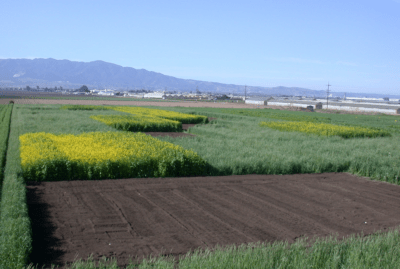
Various cover crops growing in the long-term organic systems trial at the ARS station in Salinas, CA
Imagine a farming method that not only enhances soil health and reduces the need for chemical inputs but also addresses climate change and provides economic benefits to local communities. This is the promise of organic agriculture, and nowhere is this more evident than at the USDA Agricultural Research Service (ARS) station in Salinas, Monterey County, CA. Despite the significant benefits, the future of this critical research is at risk due to underfunding. Fortunately, the region is lucky to have a strong organic champion in Rep. Jimmy Panetta. With the recent redistricting, the region also gained a member with a strong science and research background, Rep. Zoe Lofgren. We are encouraged that Rep. Lofgren has communicated she is ready to take up the mantle of defending and growing the research station.
The benefits of organic agriculture research are numerous: it serves not only the farmers who rely on it for informed decision-making but also the communities where research stations are located. These programs and agencies significantly benefit the rural communities participating in and hosting the research projects. They generate an impressive $20 of benefits for every dollar invested in public agricultural research. Organic research findings often also benefit conventional farmers, whereas findings from conventional ag research are frequently not applicable to the organic sector.
The United States Department of Agriculture’s (USDA) Agricultural Research Service (ARS) is a federal agency conducting agricultural research with stations across the country to address the evolving needs of American agriculture and beyond. Among these stations, the Salinas station stands out for its groundbreaking work in organic research. But that hasn’t always been the case.
Many years ago, organic agriculture was not a focus at the Salinas ARS, but OFRF saw the potential. We worked with Congressman Sam Farr, who represented the district at that time. Farr championed the organic research cause and secured dedicated funding that has allowed the Salinas station to become a shining example of the potential for and benefits of organic agriculture research.
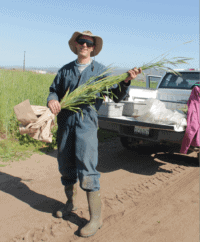
Eric Brennan with cover crop samples at the Salinas station
That initial earmarked funding allowed the research station to hire Dr. Eric Brennan, a research horticulturist specializing in organic farming systems and climate-smart agriculture. Dr. Brennan is known for his work on cover crops, soil health, and sustainable farming practices, which he explains in plain language. His research aims to improve organic farming methods to enhance productivity and environmental sustainability. He often collaborates with farmers and other stakeholders to develop practical solutions for agricultural challenges. A prime example is Dr. Brennan’s research into the nutrient management services cover crops can provide.
In a monumental moment in policy-making, Dr. Brennan used his agricultural research experience to weigh in on Ag Order 4.0, a regulatory program that protects groundwater resources in California from agricultural runoff. Dr. Brennan’s research-backed testimony shifted the course of that decision, providing insights on the scientific flaws of the regulation as it existed and instead providing the groundwork for an amended regulation that provides nutrient management credits for producers who can meet thresholds on cover crop biomass (we highlighted his story previously here). His research continues to benefit farmers and ranchers throughout California and across the country. Brennan’s findings are available in various publications, articles, and videos.
The Salinas ARS station is now a hub of organic research. In the years since securing that initial funding, OFRF has facilitated numerous tours for policymakers there, including visits with the current congressman and organic champion, Rep. Jimmy Panetta.
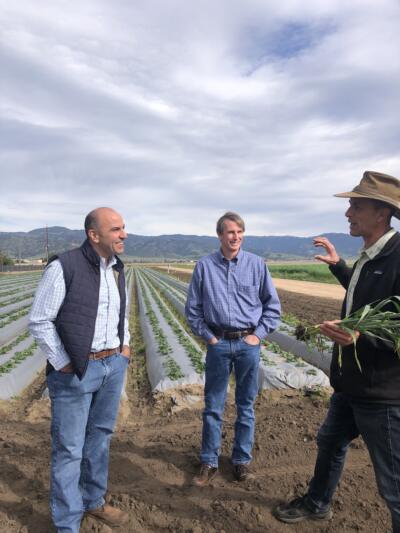
From left to right: Rep Panetta, ARS Research Leader Bill Wintermantel, and researcher Eric Brennan during a site visit to the Salinas ARS station.
However, this critical research faces an uncertain future. A recent conversation between OFRF and the ARS staff brought up a concerning reality—this vital research program is significantly underfunded. The initial funding allocated in the early 2000s hasn’t grown despite the significant and steady growth of the organic sector and the costs of conducting research. The Salinas ARS serves as a shining example of successful organic research, and it desperately needs more resources to continue thriving and supporting organic farmers.
Thankfully, Congressman Panetta has shown his leadership on organic research policy by recently organizing a group of legislators to send a letter to the appropriations committee, highlighting the station’s importance. We applaud Congressman Panetta and all who joined him for carrying on the legacy of support established by his predecessor, Rep. Sam Farr. However, the fight for adequate funding is still ongoing. The organic community must maintain and strengthen its voice to continue advocating for research like the work in Salinas.
How you can help:
- Stay Involved: Get in touch if you’d like to be part of the effort to secure funding for the Salinas ARS organic research program!
- Thank Congressman Panetta: Let him know you appreciate his support for organic agriculture research: find contact info here.
- Learn More: Reach out to OFRF for additional information: contact gordon@ofrf.org
By working together, we can ensure that the groundbreaking research at the Salinas ARS continues to benefit organic farmers and the agricultural sector as a whole.












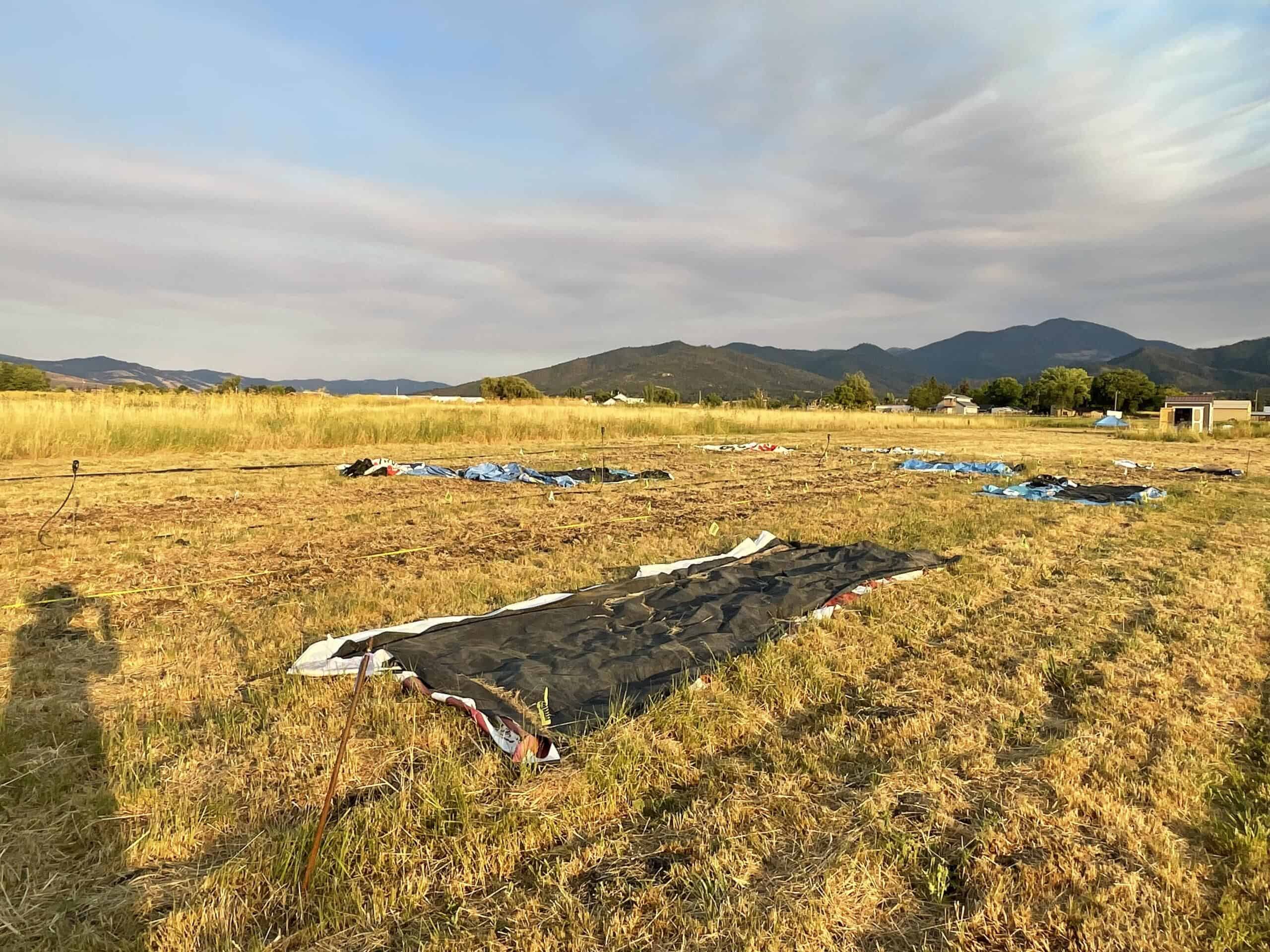

 I came into my internship at OFRF with one primary goal: to learn as much as I could about the organic farming sector in the United States. After working internationally and studying an international field in graduate school, I decided that I wanted to transition my work to be closer to home. I thought this role was the perfect opportunity to begin this transition. After completing two 10-week internship periods with OFRF’s Research & Education team, I feel more knowledgeable about organic farming in the U.S., and more confident in my professional self and abilities. This role has prepared me for my next step: working at Waltham Fields Community Farm in Waltham, Massachusetts, as their Community Outreach Farmer.
I came into my internship at OFRF with one primary goal: to learn as much as I could about the organic farming sector in the United States. After working internationally and studying an international field in graduate school, I decided that I wanted to transition my work to be closer to home. I thought this role was the perfect opportunity to begin this transition. After completing two 10-week internship periods with OFRF’s Research & Education team, I feel more knowledgeable about organic farming in the U.S., and more confident in my professional self and abilities. This role has prepared me for my next step: working at Waltham Fields Community Farm in Waltham, Massachusetts, as their Community Outreach Farmer.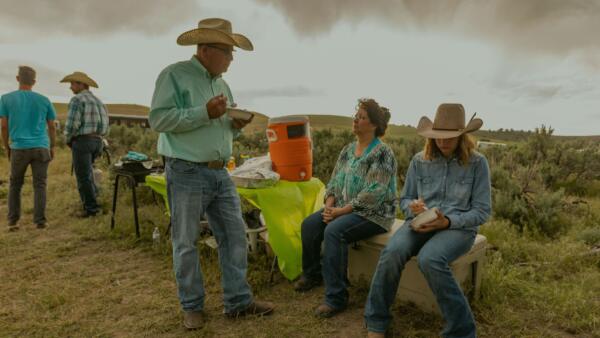 At OFRF, we are acting on that intention. We don’t just believe collaboration is the cornerstone of progress; we are actively building the foundation for it. By creating structured space and time for researchers and extension professionals within an ecoregion, we can enhance the impact of our own work and that of those researchers and extension officials. We are proud to be involved in the Transition to Organic Partnership Program for the Western and Southwestern States (TOPP-W/SW). Through this involvement, we have embarked on an initiative that brings these intentions to fruition.
At OFRF, we are acting on that intention. We don’t just believe collaboration is the cornerstone of progress; we are actively building the foundation for it. By creating structured space and time for researchers and extension professionals within an ecoregion, we can enhance the impact of our own work and that of those researchers and extension officials. We are proud to be involved in the Transition to Organic Partnership Program for the Western and Southwestern States (TOPP-W/SW). Through this involvement, we have embarked on an initiative that brings these intentions to fruition.